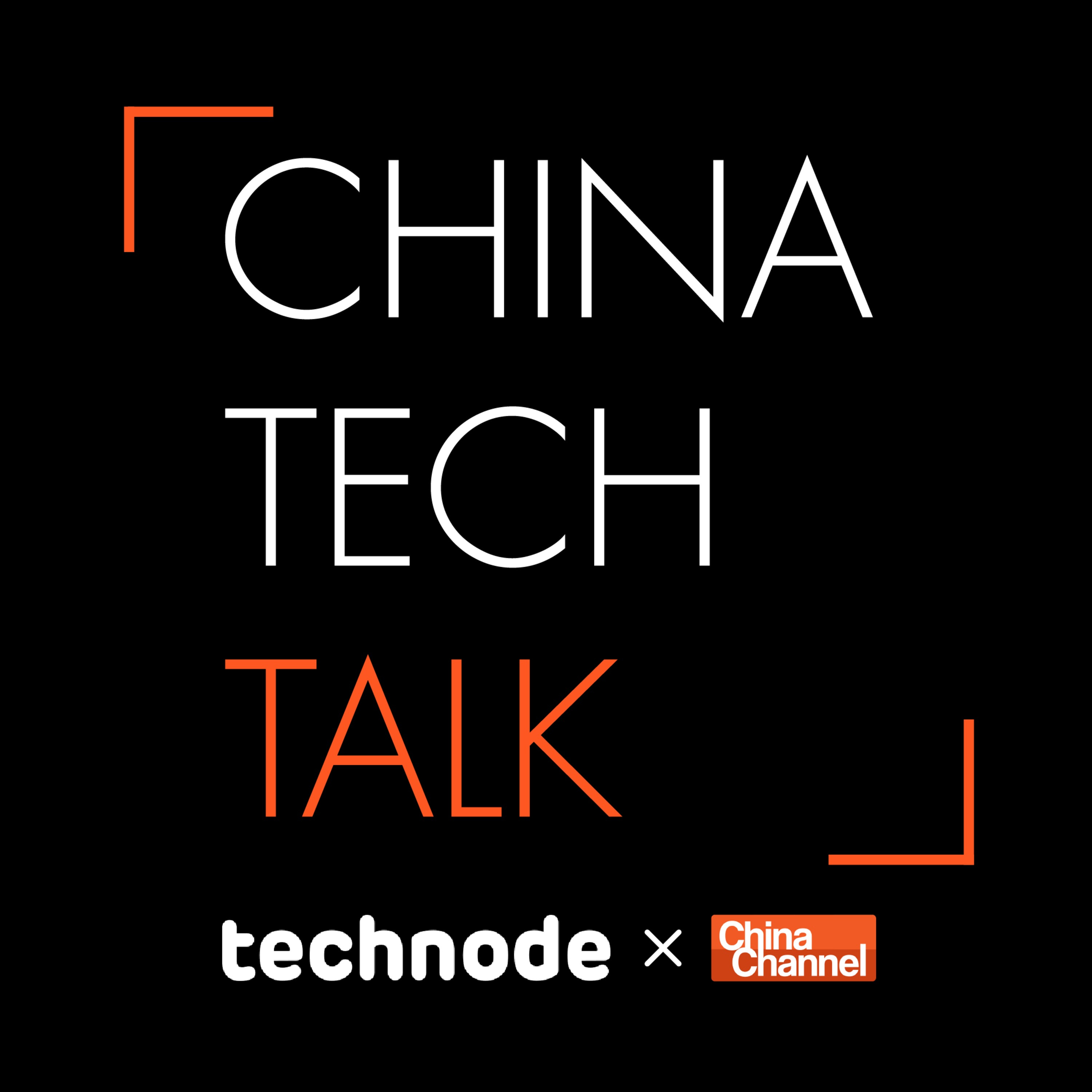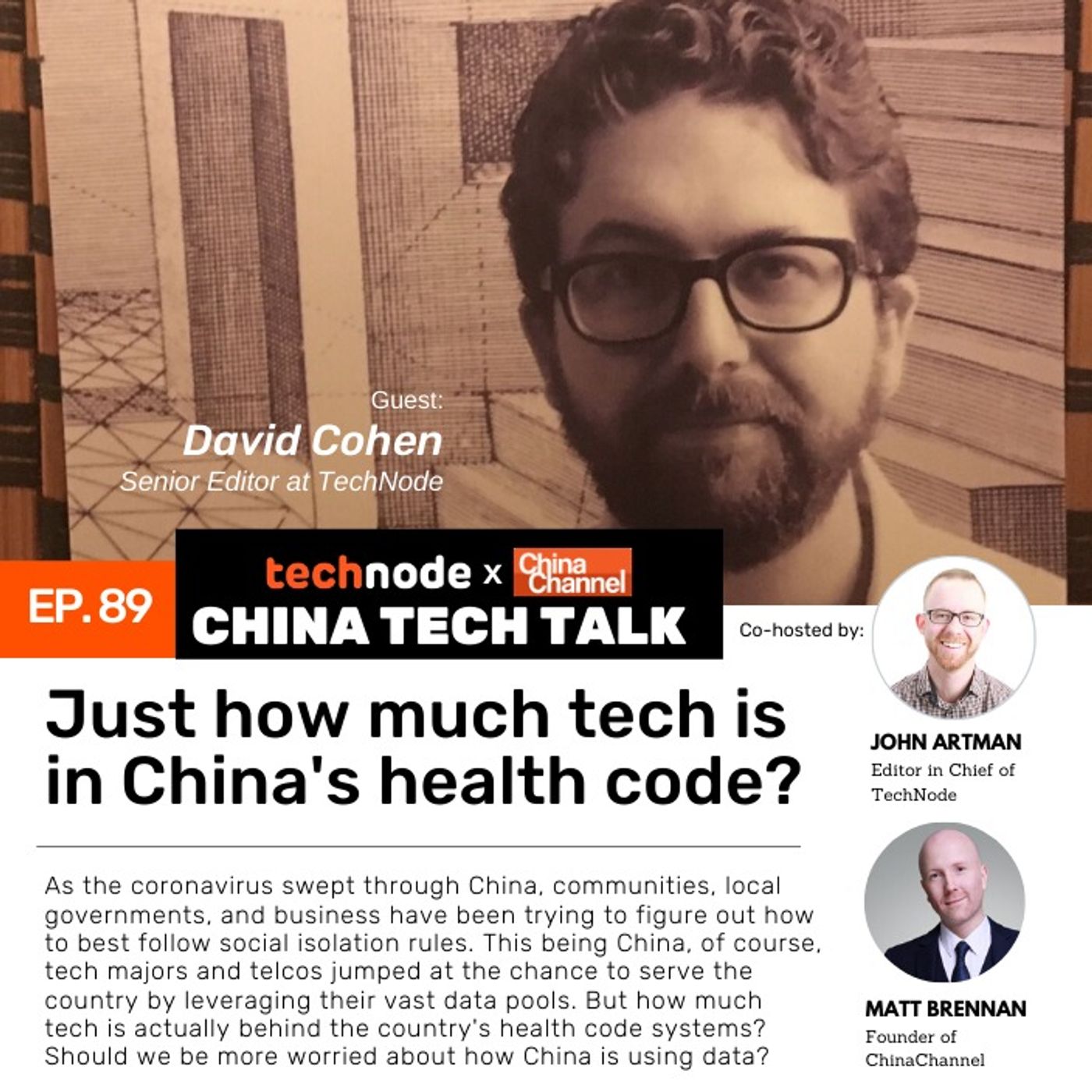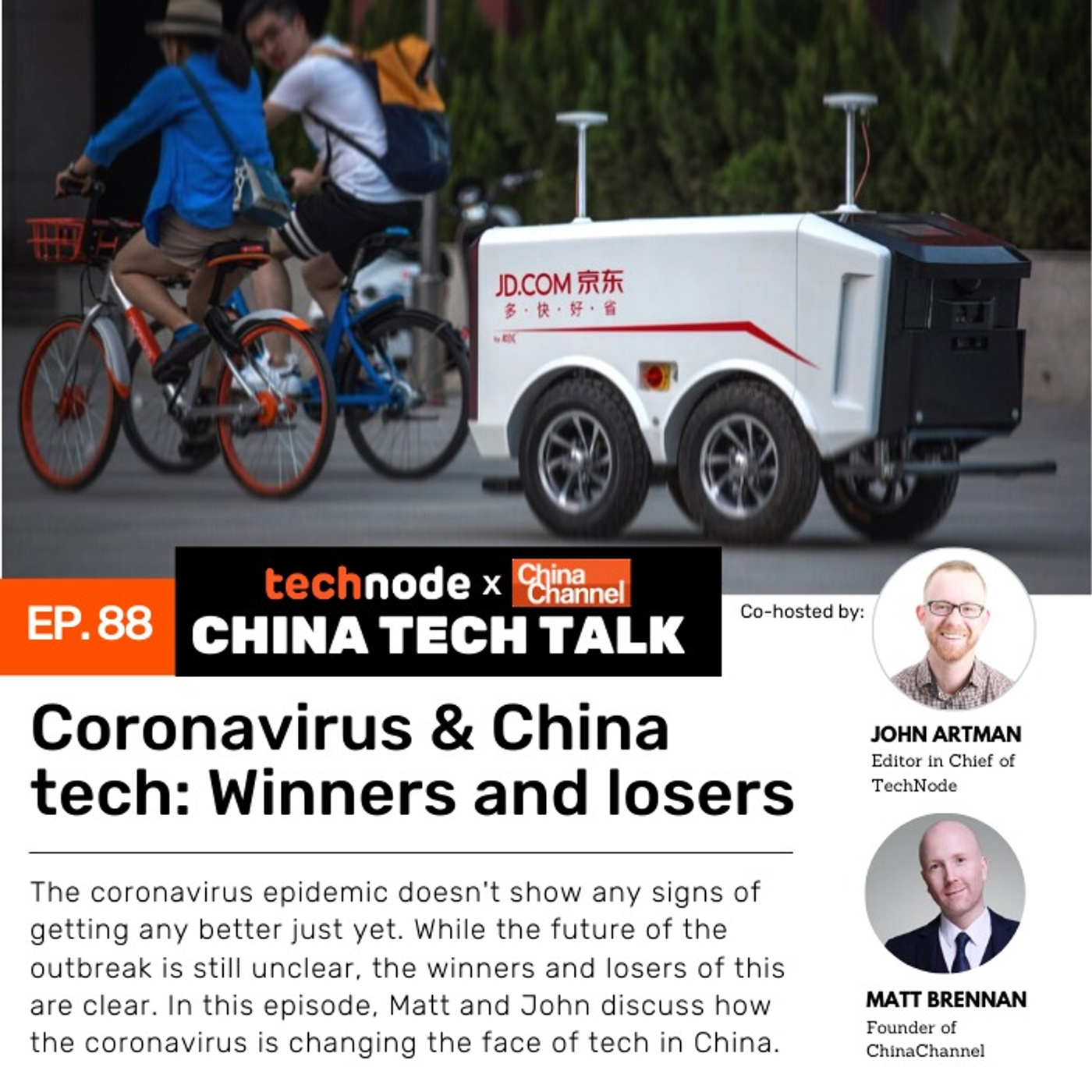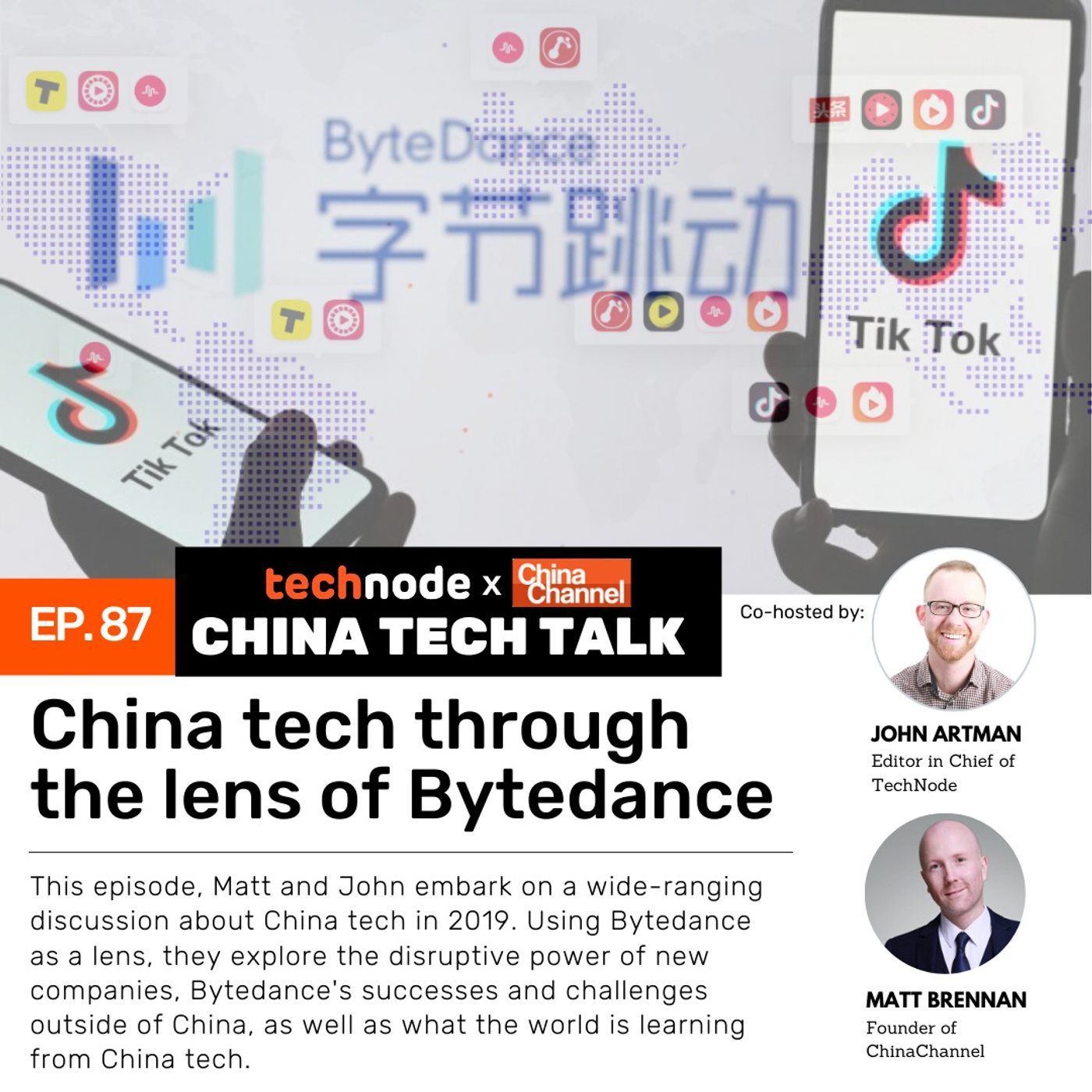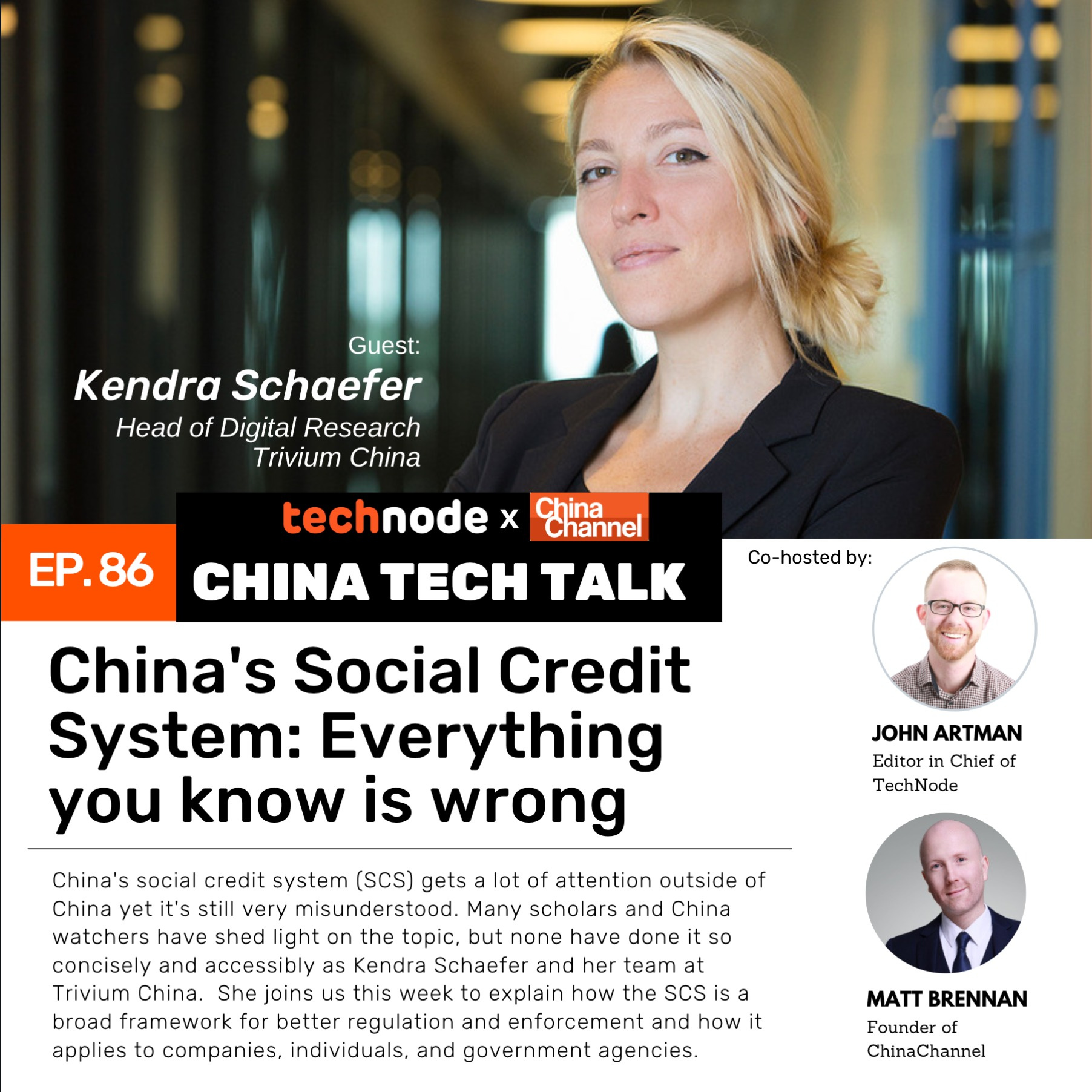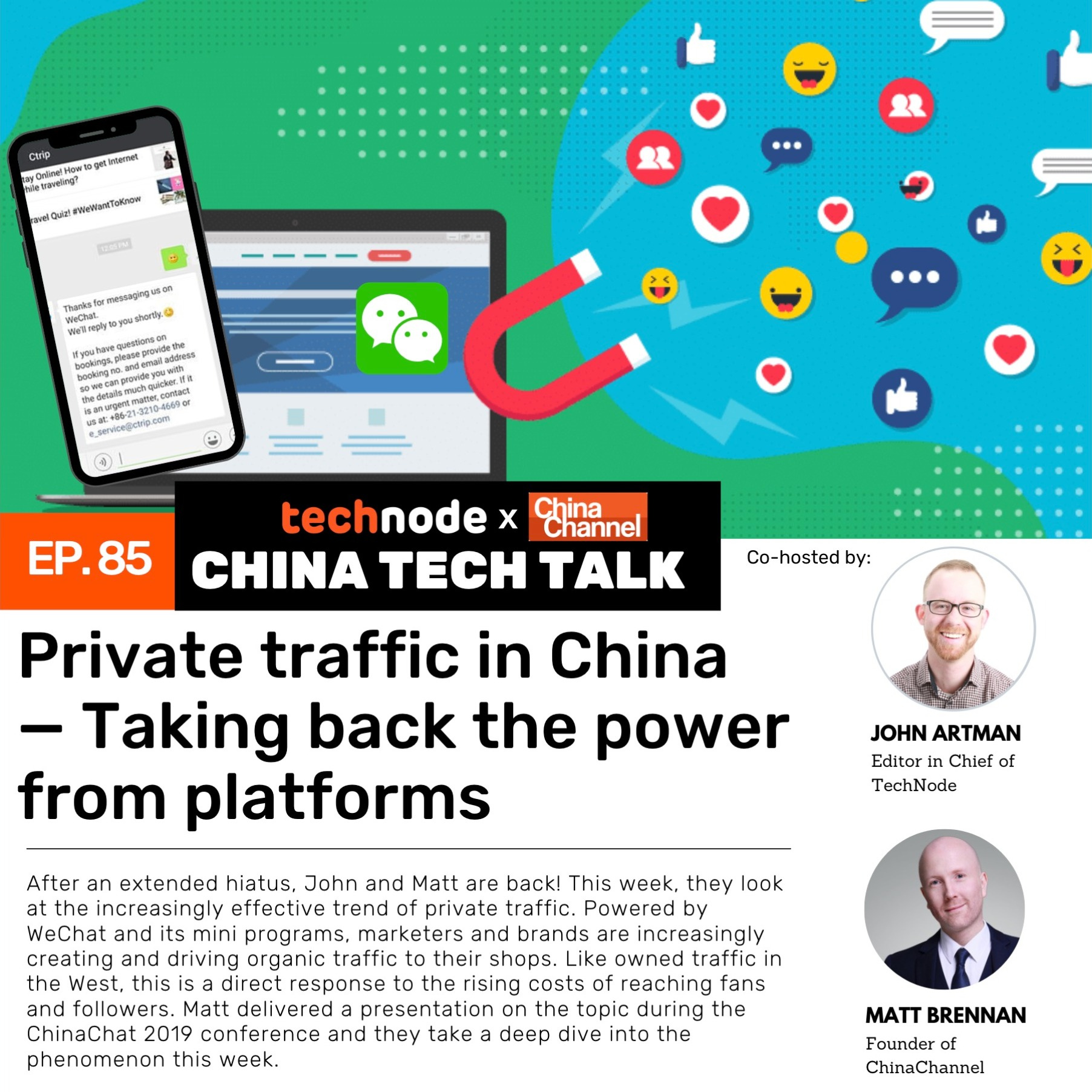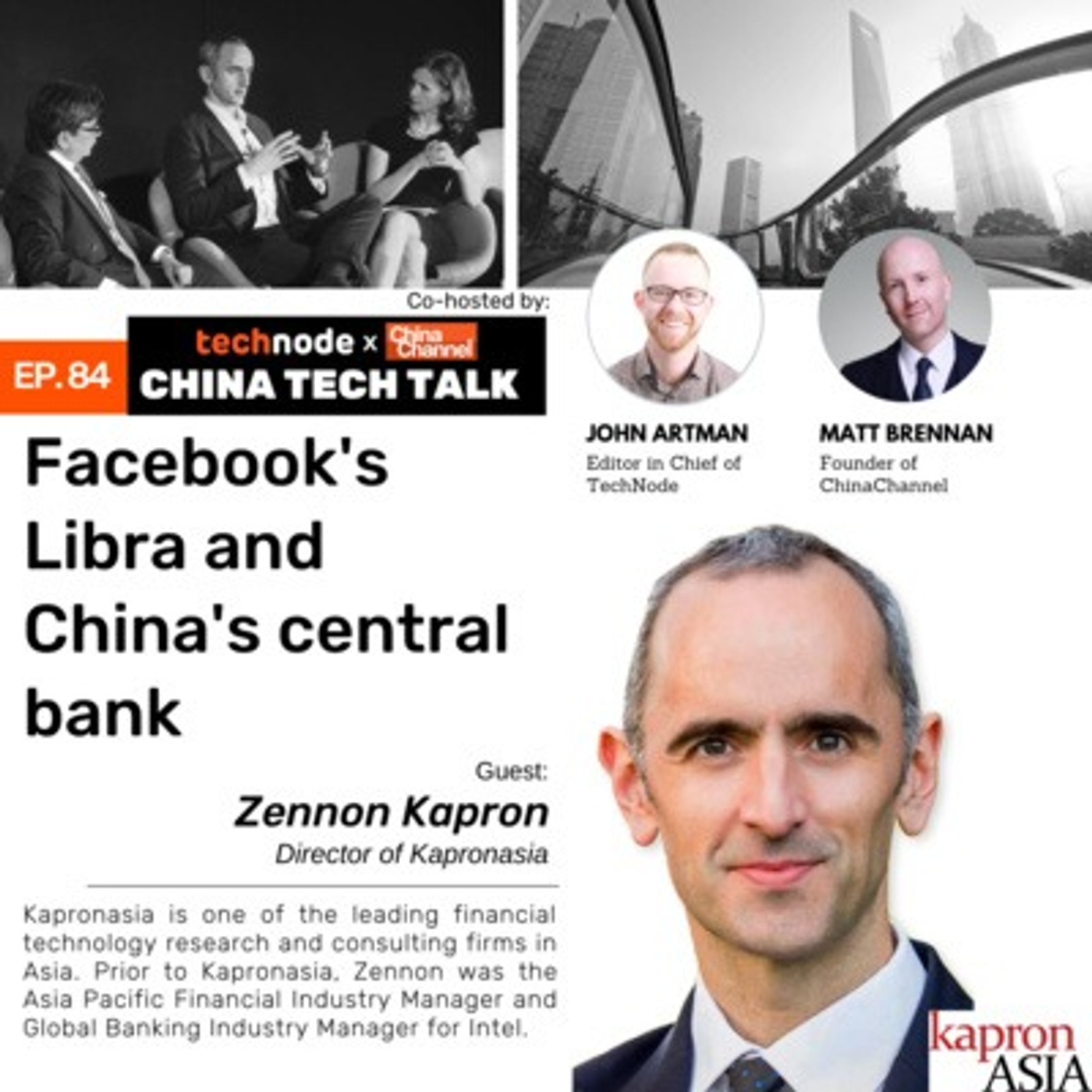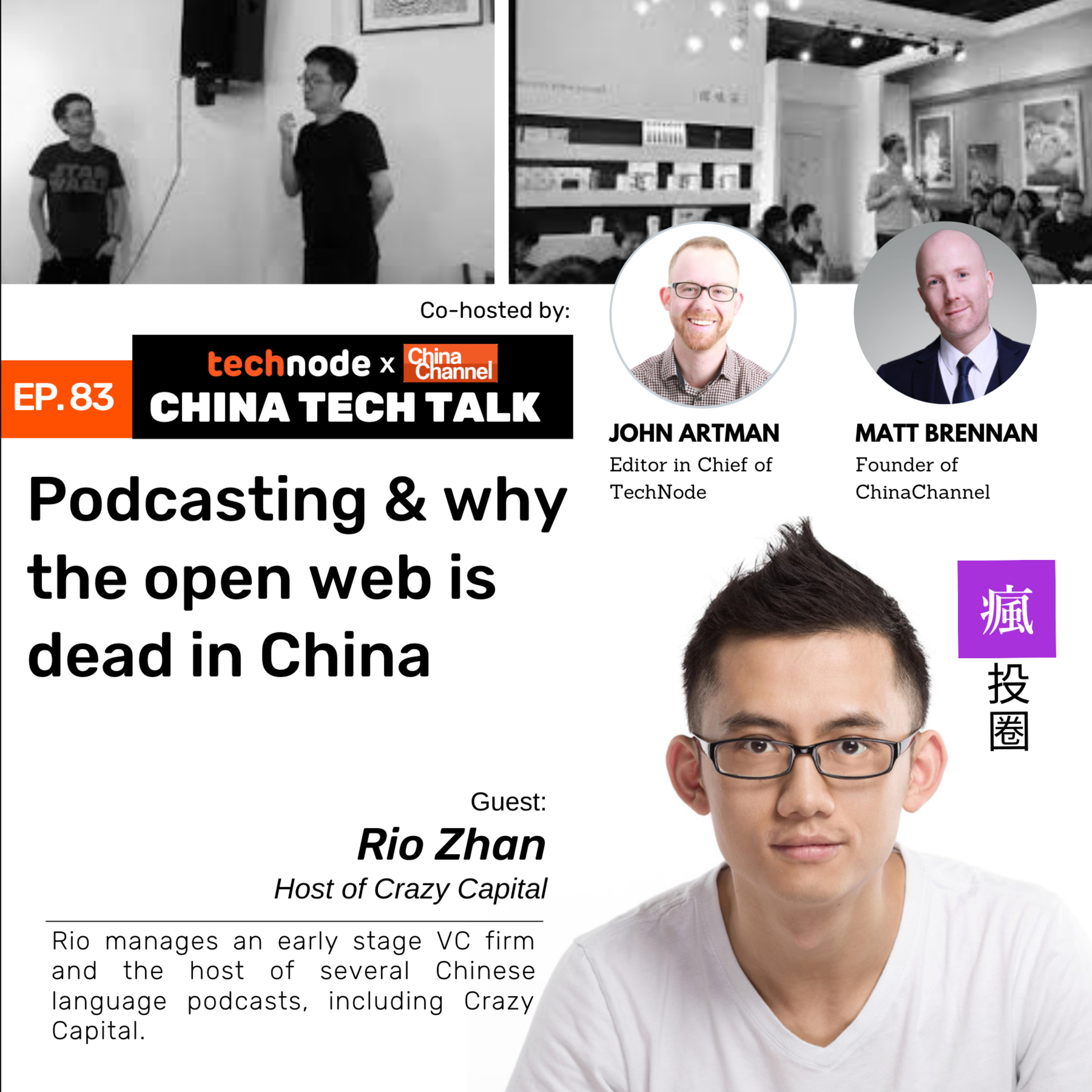China Tech Talk
China Tech Talk is a weekly podcast about what's happening on the ground in China's tech and startup ecosystems. It is hosted by John Artman, Editor-in-Chief of TechNode English, and Matthew Brennan, founder of ChinaChannel
As the coronavirus swept through China, communities, local governments, and business have been trying to figure out how to best follow social isolation rules. This being China, of course, tech majors and telcos jumped at the chance to serve the country by leveraging their vast data pools. But how much tech is actually behind the country's health code systems? Should we be more worried about how China is using data.
Links
Guest
- David Cohen, @MartynvanBuren
Hosts
Editor
Podcast information
- iTunes
- Spotify
- RSS feed
- Music: “Theme from Penguins on Parade” by Lee Rosevere, Music for Podcasts 3
The coronavirus epidemic doesn't show any signs of getting any better just yet. While the future of the outbreak is still unclear, the winners and losers of this are clear. In this episode, Matt and John discuss how the coronavirus is changing the face of tech in China.
Links
Hosts
Editor
Podcast information
- iTunes
- Spotify
- RSS feed
- Music: “Theme from Penguins on Parade” by Lee Rosevere, Music for Podcasts 3
This episode, Matt and John embark on a wide-ranging discussion about China tech in 2019. Using Bytedance as a lens, they explore the disruptive power of new companies, Bytedance's successes and challenges outside of China, as well as what the world is learning from China tech.
Key Questions
- What's changed with Bytedance since we last talked about them?
- What challenges are they facing outside of China?
- How are other countries dealing with highly successful Chinese consumer products?
- How is Bytedance acting as a disruptor at home and abroad?
- What should we be thinking about as 2019 comes to a close?
Links
Hosts
Editor
Podcast information
- iTunes
- Spotify
- RSS feed
- Music: “Theme from Penguins on Parade” by Lee Rosevere, Music for Podcasts 3
China's social credit system (SCS) gets a lot of attention outside of China yet it's still very misunderstood. Many scholars and China watchers have shed light on the topic, but none have done it so concisely and accessibly as Kendra Schaefer and her team at Trivium China. She joins us this week to explain how the SCS is a broad framework for better regulation and enforcement and how it applies to companies, individuals, and government agencies.
Key questions
- What is the purpose of the SCS? How far along is its development?
- Is the SCS only for individuals?
- How does the SCS apply to companies?
- How are China's cities gamifying SCS?
Links
- 77: Peer-to-peer lending in China—Tech-driven shadow banking with Andrew Polk
- The apps using social credit in China
- Executive Summary: UNDERSTANDING CHINA’S SOCIAL CREDIT SYSTEM
- China's Social Credit System: An Evolving Practice of Control
- Keeping track of social credit
- EUROPEAN CHAMBER REPORT ON CHINA’S CORPORATE SOCIAL CREDIT SYSTEM A WAKE-UP CALL FOR EUROPEAN BUSINESS IN CHINA
- Become a member of TechNode Squared
Guest
- Kendra Shaefer, @triviumchina
Hosts
Editor
Podcast information
- iTunes
- Spotify
- RSS feed
- Music: “Theme from Penguins on Parade” by Lee Rosevere, Music for Podcasts 3
After an extended hiatus, John and Matt are back! This week, they look at the increasingly effective trend of private traffic. Powered by WeChat and its mini programs, marketers and brands are increasingly creating and driving organic traffic to their shops. Like owned traffic in the West, this is a direct response to the rising costs of reaching fans and followers. Matt delivered a presentation on the topic during the ChinaChat 2019 conference and they take a deep dive into the phenomenon this week.
Key questions
- What is private traffic?
- Why are brands resorting to this method?
- How does private traffic work?
- How do WeChat and Tencent view private traffic?
- What are traditional e-commerce platforms like Taobao doing to combat private traffic?
Links
- TechCrunch Shenzhen Nov 11-12
- Presentations from ChinaChat 2019
- China Tech Talk 83: Podcasting and why the open web is dead in China with Rio Zhan
- China Tech Talk 10: [Interview] Influencers in China and the future of brands with Elijah Whaley
- China Tech Talk 37: Weibo’s KOL woes with Elijah Whaley
- Become a member of TechNode Squared
Hosts
Editor
Podcast information
- iTunes
- Spotify
- RSS feed
- Music: “Theme from Penguins on Parade” by Lee Rosevere, Music for Podcasts 3
Just weeks after Facebook announced their Libra cryptocurrency project, the People's Bank of China has become quite vocal about their on-going project. Most recently, the PBOC announced that China's digital currency is "nearly ready." Following on from our previous conversation about Libra and QQ Coin, this week we're joined by Zennon Kapron, director of Kapronasia, to look at what Libra means in a global context as well as China's plans to launch its own digital currency.
Key questions
- What are the biggest implementation and adoption challenges for Libra?
- Why don't governments like cryptocurrency?
- How does a digital currency affect the RMB's status?
- What are the downsides of a digital fiat currency?
Links
- China Tech Talk 33: Fintech IPOs and the future of money in China with Zennon Kapron
- China Tech Talk 80: Libra lessons from WeChat and QQ
- China fast-tracks development of national digital currency in response to Libra
- China’s digital fiat currency is ‘nearly ready’ for launch: PBOC official
- WeChat Conference: CHina CHat 2019!
- Become a member of TechNode Squared
Guest
Hosts
Editor
Podcast information
- iTunes
- Spotify
- RSS feed
- Music: “Theme from Penguins on Parade” by Lee Rosevere, Music for Podcasts 3
At the end of 2018, Connie Chan of Andreesen Horowitz, wrote about how podcasts in China monetize. However, what she calls podcasts aren't really what we call podcasts: they're more like paid-for educational audio content. Podcasting, like what we do at China Tech Talk, is actually still very immature in China. But that doesn't mean there aren't content creators following the "traditional" podcasting model.
To talk about this, we're joined this week by Rio Zhan, early stage VC and host of the Crazy Capital podcast. We share notes on podcasting and talk about how China's content models have evolved away from the open web.
Key questions
- Why is the China market different for audio content?
- Why is the open web almost non-existent in China?
- What role does culture play in creating acceptance of paying for content?
- How might Facebook's Libra enable monetization for Western podcasts?
Links
- Crazy Capital (in Chinese)
- Outgrowing Advertising: Multimodal Business Models as a Product Strategy
- The Dark Forest Theory of the Internet
- WeChat Conference: CHina CHat 2019!
- Become a member of TechNode Squared
Guest
- Rio Zhan, @RioJot
Hosts
Editor
Podcast information
- iTunes
- Spotify
- RSS feed
- Music: "Theme from Penguins on Parade" by Lee Rosevere, Music for Podcasts 3
In the tech and startup ecosystem, there's always another conference to attend. The landscape isn't all that clear, however, with some conferences getting more public hype and others keeping it low-key. After organizing and attending many of them, John and Matt sit down this week to go over what's out available, what makes certain conferences different, and which are some of the best to attend and why.
Key questions
- What kinds of conferences are there?
- What should you consider before going to a conference in China?
- How do conferences monetize?
- How much work goes into a successful conference?
Links
Hosts
Editor
Podcast information
- iTunes
- Spotify
- RSS feed
- Music: "Theme from Penguins on Parade" by Lee Rosevere, Music for Podcasts 3
In June, Carrefour sold 80% of its China operations to electronics retailer Suning. The news is representative of a much broader shift in the new retails space. When we first covered new retail in 2018, unmanned stores were gaining traction and it was unclear if Alibaba was going to win. In 1.5 years, unmanned stores are almost dead and Alibaba is a clear winner.
To discuss this shift, we're happy to welcome Michael Norris, research and strategy manager at AgencyChina.
This episode was recorded on June 25, 2019.
Key questions:
- Why would Suning be interested in Carrefour?
- How did JD lose the new retail battle?
- What makes Hema and the Alibaba model so successful?
- What makes the China market so difficult for non-China retailers?
Links
- New Retail Keynote (Dropbox)
- Carrefour sells 80 per cent of its Chinese retail operations to Suning for 4.8 billion yuan
- Why it’s time to wake up and smell the coffee on Luckin
- WeChat Conference: CHina CHat 2019!
- Become a member of TechNode Squared
Guest
Hosts
Editor
Podcast information
- iTunes
- Spotify
- RSS feed
- Music: "Theme from Penguins on Parade" by Lee Rosevere, Music for Podcasts 3
On June 18, Facebook announced the Libra cryptocurrency, a solution to their P2P payments conundrum. As to be expected, this move has gotten a lot of attention. In China, that attention has taken the form of comparing Libra to Tencent's breakthrough Q Coin as well as how WeChat has integrated payments.
Key questions:
- What is Q Coin?
- What's the difference between a virtual currency and a cryptocurrency?
- What is the relationship between Libra, Calibra, and Facebook?
- Will China ever have something like this?
Links
- Everything you need to know about Libra, Facebook’s ambitious cryptocurrency
- Can Facebook’s Libra replicate WeChat Pay’s digital payment dominance?
- Facebook, Libra, and the Long Game
- FACEBOOK’S CALIBRA IS A SECRET WEAPON FOR MONETIZING ITS NEW CRYPTOCURRENCY
- Become a member of TechNode Squared
Hosts
Editor
Podcast information
- iTunes
- Spotify
- RSS feed
- Music: "Theme from Penguins on Parade" by Lee Rosevere, Music for Podcasts 3
Facial recognition has taken off in China. Perhaps the most widely implemented use case, facial recognition is used to deter jaywalkers, track attention and behavior in schools, catch criminals, monitor live streamers, and more. Unlike Western countries, China's privacy protections laws are almost non-existent, but that is changing with draft legislation soon to be released
Key questions:
- What is China's plan for facial recognition?
- How is facial recognition being used now?
- What are the local attitudes toward the technology?
Links
- Video: Facial recognition is on the rise in China
- Upgraded AI surveillance helps nab student suspected in mother’s murder
- Inside China Tech podcast
- Become a member of TechNode Squared
Guest
Hosts
Editor
Podcast information
- iTunes
- Spotify
- RSS feed
- Music: "Theme from Penguins on Parade" by Lee Rosevere, Music for Podcasts 3
Last week, the White House announced a ban on US companies doing business with companies deemed a security risk. Over the weekend, Google announces that they must suspend Huawei's access to Android. This episode, Matt and John have a short discussion about what the announcement means for Huawei and what the company may be able to do about it.
Correction: In this episode, John says that "HongMeng OS" could be translated as "Red Dream." This is incorrect. The characters for HongMeng are 鸿蒙 and refers to the Chinese mythology's primal chaos.
Links
- Hongmeng, Huawei’s proprietary OS, incorporates next-generation technology
- Shanghai tech board to push semiconductor independence
- Why Huawei’s ‘wolf culture’ will help telecom titan fight off attacks and thrive
- Halt and Catch Fire (TV series about making an OS)
- Frontline: Trump's Trade War
- Become a member of TechNode Squared
- Get your tickets to the first annual Emerge
Hosts
Editor
Podcast information
- iTunes
- Spotify
- RSS feed
- Music: "Theme from Penguins on Parade" by Lee Rosevere, Music for Podcasts 3
China’s online peer-to-peer lending industry has been in turmoil for the last three years as financial regulators have clamped down as part of “de-risking” efforts. Tuandai.com, a top P2P lender, collapsed in March due to turnover problems. As of February, the platform had more than 220,000 investors with RMB 14.5 billion ($2.15 billion) in outstanding loans. The company is under investigation for illegal fundraising, leading to the arrest of 41 people so far, including co-owners Tang Jun and Zhang Lin.
This week, Andrew Polk, partner at Trivium China, joins us to discuss what's happening with the P2P lending industry in China.
Key questions:
- What role has the government played in the growth and death of P2P lending?
- How is the crackdown on cryptocurrency different from the tightening regulations around P2P lending?
- Are P2P companies really tech companies, as many claim?
- Can we expect companies like Dianrong to survive this round of government scrutiny?
Links
- 22: P2P lending, retail banking, and the future of online services with Ling Kong
- The Trivium Tip Sheet
- Become a member of TechNode Squared
- Get your tickets to the first annual
Guest
Hosts
Producer
Podcast information
- iTunes
- Spotify
- RSS feed
- Music: "Theme from Penguins on Parade" by Lee Rosevere, Music for Podcasts 3
With the number of English speakers around the world, it's no surprise that Chinese AI experts and engineers are keeping up with developments across the Pacific. However, the same is not true when it comes to the Chinese language. Indeed, Andrew Ng, former Chief Scientist at Baidu and co-founder of Coursera, made this exact point years ago when interviewed about China's AI progress. Jeffrey Ding, China lead for the Center for the Governance of AI, is trying to change that information asymmetry with his ChinAI newsletter featuring translations of Chinese thought leadership in AI.
Links
- ChinAI newsletter
- How I learned to stop worrying and love surveillance capitalism
- 62: AI Superpowers with Kai-Fu Lee
- TechNode Podcast Network
Guest
Hosts
Producer
Podcast information
- iTunes
- Spotify
- RSS feed
- Music: "Theme from Penguins on Parade" by Lee Rosevere, Music for Podcasts 3
Free cash flow is cash a company can use for whatever they want. If Pinduoduo is free cash flow positive they’ll likely be able to continue their growth spend and get even larger. If its free cash flow negative, the growth plan will put too much strain on their cash position and, it will eventually fail. To say it simply: the stakes are high.
This week, we're joined by James Hull, professional investor and co-host of the China Tech Investor podcast, to take a look at Pinduoduo's actual financial health.
Links
- Pinduoduo’s free cash flow conundrum
- 43: The e-commerce platform becoming a threat to Alibaba with Thomas Graziani
- China Tech Investor podcast
- TechNode Podcast Network
Guest
Hosts
Producer
Podcast information
- iTunes
- Spotify
- RSS feed
- Music: "Theme from Penguins on Parade" by Lee Rosevere, Music for Podcasts 3
One of the earliest companies to get into bitcoin mining, Bitmain makes and sells mining equipment and manages one of the world's largest bitcoin mining pools. A controversial company in the space (as are most), Bitmain backed the Bitcoin Cash fork as well as the subsequent fork into Bitcoin Cash ABC.
This week we are joined by Nishant Sharma, International PR and Communications Director at Bitmain, to talk about the company, some of their tech, as well as their future plans.
This episode was recorded on January 31, 2019.
Links
- How the world’s largest bitcoin miner is taking on AI’s most powerful players
- Bitmain co-founder Wu Jihan may be departing from core business
- TechNode Podcast Network
Guest
- Nishant Sharma, @nishantsharma87, LinkedIn
Hosts
Producer
Podcast information
- iTunes
- RSS feed
- Music: "Theme from Penguins on Parade" by Lee Rosevere, Music for Podcasts 3
All of China's most visible mobility players have undergone significant change over the last 12 months. Ofo is on the verge of collapse, Mobike is now Meituan Bike, and Didi is grappling with how to move past their existential safety problem.
Links
Hosts
Producer
Podcast information
- iTunes
- RSS feed
- Music: "Theme from Penguins on Parade" by Lee Rosevere, Music for Podcasts 3
Early last year, the central government put a freeze on gaming approvals, shutting out many big titles from making money, including PUBG and Fortnite. However, in December, they reopened approvals only to find themselves with a 6-month backlog, leaving giants Tencent and Netease still unable to monetize their biggest hits.
Daniel Ahmad, analyst at Niko Partners, joins us again to talk gaming regulation in China, the role of mini games in the WeChat vs Douyin battle, and how Steam is faring in the Middle Kingdom.
Links
Guest
- Daniel Ahmad, @ZhuGEX
Hosts
Producer
Podcast information
- iTunes
- RSS feed
- Music: "Theme from Penguins on Parade" by Lee Rosevere, Music for Podcasts 3
While everyone is talking about China's expansion into Southeast Asia, China's largest neighbor has become the real target for China's tech companies. This week, Shadma Shaikh, writer at Factor Daily, joins us to discuss the takeover and what Indian entrepreneurs are learning from their Chinese counterparts.
This week saw a multitude of messaging app announcements. First was WeChat's Open Class PRO featuring a four-hour speech from Allen Zhang. Then, on the same day, Bytedance announced their own messaging app (Duoshan 多闪), what appears to be a clone of Snapchat, and Bullet Messenger announced their upgrade and rebrand to Liaotianbao (聊天宝). All three events, and the recent update to WeChat 7.0, raise interesting questions about the messaging market, WeChat's primacy, and the ascendancy of Bytedance.
This week, Matt and John take a look at the stories and trends of 2018, including gaming restrictions, Tencent's restructuring, the delivery and coffee wars, WeChat mini programs, and Bullet Messenger
This week, Matt and John take a look at the stories and trends of 2018, including ZTE/Huawei, AI in China, Bytedance, blockchain, and the death of bike rentals. This is the first of two parts.
This week, John and Matt talk with Shai Oster, Asia bureau chief for The Information, about the rash of Chinese IPOs in a down market, looking at Tencent Music, Xiaomi, Pinduoduo, Meituan Dianping. We also talk about the possibilities for Bytedance and Ant Financial IPOs in 2019.
Links
- China Tech Talk 49: The Xiaomi IPO with The Information’s Shai Oster
- What China’s history of overseas tech IPOs says about the current wave
- TechNode IPO coverage
- Sign up for TechNode newsletters
- Subscribe to The Information
- Shai Oster - The Information author page, @beijingscribe
- iTunes
- RSS feed
- China Tech Talk.com
- Music: "Theme from Penguins on Parade" by Lee Rosevere, Music for Podcasts 3
Bytedance, formerly known as Jinri Toutiao, is on deck for discussion this week. Beginning from pure textual content and recommendation, Bytedance has seemingly found the key to human attention. While this makes for a great product, and compelling business, whether they can make it in the US market is still unclear.
China Tech Investors is the latest addition to the TechNode podcast network. Each week, the hosts look at publicly listed Chinese companies and have an interview with an expert to talk about companies and issues affecting the markets.
This week they talk G20 and China-US tensions with Chris Balding. Search in iTunes or your favorite podcast app for "China Tech Investor" to subscribe.
Ted Hopkins, Senior Director of Walmart Ecommerce, joins us to talk about mini programs, eliminating lines in stores, and the future of retail in China.
Alvin Wang Graylin joins us this week from the sidelines of TechCrunch Shenzhen to talk about the broader potential of VR and the specific outlook for VR in China.
Wang Boyuan is back! This time we're talking about Mafengwo and the curious case of extremely unreliable numbers in China. Not only Mafengwo, but also Alibaba, JD.com, and Dianping are mentioned in the discussion.
Guest
Wang Boyuan – @thisboyuan
Hosts
John Artman, @knowsnothing
Matthew Brennan, @mbrennanchina
Kai-Fu Lee joins us this week to talk about his new book, AI Superpowers, and the distinct advantages and differences between the US and China in this increasingly important technology.
Ahead of Tencent Music Entertainment's IPO, John and Matt are joined by Wang Boyuan, translator and editor of TechCrunch.cn, to take a look back at how the music industry has been influenced by tech as well as the evolving online music market, now dominated by Tencent.
This week, John and Matt talk Fritz Demopoulos, founding partner of Queens Capital, about his journey at Qunar, how the company was founded, challenges they faced building the company, and advice for entrepreneurs in China today.
This week, John and Matt talk with Samm Sacks, Senior Fellow, Technology Policy Program at the Center for Strategic & International Studies, about China's cybersecurity law and how it relates to the social credit system as well as the future of data regulation in China.
This week, John and Matt talk about the messaging app that's shot like a bullet (pun intended) to top of app store charts as well as brief discussion of shady PR and persuasion practices in China.
This week, John and Matt talk with Heatherm Huang, a founding member of TalkBox, one of the first chat apps with push-to-talk functionality, about the history of chat message apps in China.
This week, John and Matt look at the recent developments in China's emerging coffee conflict and examine the Tencent/Alibaba turf war, whether the Starbaba tie-up will be a game changer, and the power of rethinking business models for the mobile age.
This week, John and Matt talk with Elliot Zaagman, writer, executive coach, and corporate trainer, about the intense internal culture at Huawei. We even sneak in a surprise interview with an insider at the end.
This is the second of two parts.
This week, John and Matt talk with Elliot Zaagman, writer, executive coach, and corporate trainer, about the intense internal culture at Huawei. We even sneak in a surprise interview with an insider at the end.
This is the first of two parts.
This week, John and Matt talk about how to understand China from a macro-level, including its role in the world, the different cultural values, and the difficulty in explicating a nuanced understanding of the Middle Kingdom.
This week, John and Matt talk with Victor Tseng, Chief Communications Officer for Ctrip, about Chinese travelers, Ctrip's globalization strategy, and the challenges of going abroad.
This week, John and Matt take a look back at 1 year of podcasting and pull out the best part of the best episodes. This is part 2 of 2.
This week, John and Matt take a look back at 1 year of podcasting and pull out the best part of the best episodes. This is part 1 of 2.
Episode highlights include:
04: Interview with Florian Bohnert
10: Influencers in China & the future of brands with Elijah Whaley
15: Baidu ain't that bad with Kaiser Kuo
18: China's gaming & e-sports industry with Daniel Ahmad
19: China's $20 billion news app with Dannie Li
20: Alipay vs WeChat & why smile to pay matters
This week, John and Matt talk with Shai Oster, Asia bureau chief for The Information, about Xiaomi's impending IPO, including why so many companies are choosing to go public this year, the advantages of listing in Hong Kong, and if their business model can stay viable.
This week, John and Matt talk with Wang Boyuan, editor of TechCrunch.cn, about media inside and outside China, some of the hazards as a reader, and some tips on where to get reliable information about the Middle Kingdom.
This week, John and Matt talk with Benjamin Joffe, General Partner at HAX, about why Shenzhen is so strong with hardware, the fate of ZTE and the role of national security, and IP protection in China.
John and Matt discuss the power of examining first principles in an increasingly mobile-centric marketplace in the case of new coffee delivery startup Luckin (瑞亲) Coffee.
This week, John and Matt talk with Liza Lin, China technology reporter for the Wall Street Journal, about the increasing competition between Tencent and Alibaba in offline retail.
John and Matt talk about Douyin, the breakout short video app of 2017, how it stacks up against Kuaishou (aka Kwai)—China's "low" humor video app, and some predictions for short video apps in 2018.
This week, John and Matt talk with Thomas Graziani, founder and CEO of WalktheChat, a company that specializes in helping foreign organizations access the Chinese market through WeChat.
This week, John and Matt talk about recent developments in China's mobility and the O2O market as Meituan acquires Mobike and joins others encroaching into Didi territory.
We're back! Sorry for being gone so long. Hope you didn't miss us too much.
This week, John and Matt talk with Stephane Monsallier, founder of Shops of the Future, about new retail and Alibaba's strategy with Hema.
Matt and John try to understand the recent (and not so recent) moves by China's internet giants into offline retail.
Matt and John talk with Charlie Moseley, an American games developer based in Chengdu. We start the conversation about PlayerUnkown's Battlegrounds and then go into the future of Steam as well as PUBG's prospects in 2018.
[This was recorded on 01 Feb 2018]
Matt and John talk with Edith Yeung, managing partner at 500 Startups about blockchain, AI, and how China's startups fit into global trends.
Edith Yeung on WeChat: edithyeung
Matt and John welcome Elijah Whaley, CMO of PARKLU, onto the show again. We catch up with what's he's been working on lately and then discuss some new heavy-handed rent-seeking from Weibo.
Matt and John talk with Manya Koetse, found and editor-in-chief of What's on Weibo, about how the role of Weibo in Chinese society and its continuing relevance in public discourse.
Matt and John talk about recent developments in WeChat, including new insights from WeChat Open Class, the role of mini programs and games, and "WeChat as a Platform" (WaaP).
Matt and John talk with Naomi Wu, a well-known online personality known for her hardware and making projects.
Thanks a bunch to @Broadcastorm for the suggestion and making the intro!
Matt and John talk with Zennon Kapron, founder of Kapron Asia, about fintech in China, P2P lending, fintech IPOs, and money in China
This week, Matt and John discuss the top 5 trends (plus some honorable mentions) in China's tech for 2017 and make some predictions going into 2018. This is the second of two parts.
This week, Matt and John discuss the top 5 trends (plus some honorable mentions) in China's tech for 2017. This is the first of two parts.
This week, we hear from BingoBox and Xiaomi about their products, market strategy, and the future of their verticals
This week, Matt and John talk about what Tencent's $2 bln investment in Snap means for both companies (John also goes down a rabbit hole about Chinese consumer psychology).
This week, Matt and John speak with Dominic Penaloza, CIO of naked Hub, about co-working in China as well as what naked Hub is doing to reinvent commercial real estate.
After a lackluster response from China for the iPhone 7, and consecutive quarterly declines in market share, many have wondered if we are watching the beginning of the end for Apple in China.
This week, Matt and John revisit their discussion about Apple in China to look at how the country's consumers have responded to the iPhone X.
Some call Uber's China foray a failure but looking at the DNA of the company, its values of radical ownership and operational focus have reshaped entrepreneurship in China.
This week, Matt and John talk about the lasting impact Uber has had on the entrepreneurs and their startups since they exited Chin
This week John and Matt follow up with Florian Bohnert, Head of Global Partnerships about what Mobike has been up to since we last talked, including:
- How Mobike has expanded into global markets
- The challenges of globalizing from China
- Finding talent and educating users
- Differences in recreational vs commute use in different countries
- Whether Mobike will expand beyond bikes
The first reference episode for China Tech Talk delves into the broader conditions enabling China speed, including:
- Economic growth and habituated pace of change
- Generational differences in user habits
- Super apps
- Values that don't include net neutrality or the open web
- The phone as life's control center
John and Matt start with new group chat rules as well as VPNs and end up talking about deeper questions the economic implications of a truly tech-savvy Chinese government, specifically:
- Rules affecting group chats in WeChat, QQ, and Baidu Tieba
- The technical sophistication of China's internet control policy
- How China's policy towards the internet helped create BAT
- What a China with perfect information might look like
John and Matt talk with Ling Kong, CTO of Dianrong about:
- How peer-to-peer (P2P) lending got started
- What makes Dianrong different from their competitors (hint: there's a reason we're talking to the CTO)
- How the government sees the P2P lending industry
- Why and how China's credit habits are changing
- What a private blockchain application could look like
This week, John speaks with Patrick Dai, co-founder & chairman of Qtum foundation, about:
- What ICOs are
- Why companies want to do ICOs
- How many ICOs are fraudulent
- Why the Chinese government banned ICOs
- How long the ban will last
- How this will affect blockchain companies and applications
Matt and John start with Alipay's recent "smile to pay" demo and end with a discussion on why WeChat went into payments in the first place. Along the way, they talk about:
- Alipay and WeChat's money market funds
- WeChat's new money market fund feature
- The dangers and benefits of ubiquitous facial recognition
-The role WeChat and Alipay are playing in reshaping retail banking in China
-Whether Alipay can ever become a platform like WeChat
This week Matt and John talk with Dannie Li, an analyst at China Tech Insights about Jinri Toutiao, a Chinese content aggregator recently valued at $20 billion, including:
- Why Jinri Toutiao is so popular
- How it is so sticky
- Its business model and why its valuation is high
- Why advertisers love it so much
- Risks to the app and business model
- Conflicts between Toutiao and content producers
- Challenges as Toutiao expands inside and outside China
This week Matt and John talk with Daniel Ahmad, an analyst at Niko Partners about:
- The uniqueness of China's games market
- The size of the e-sports industry
- How gaming and e-sports are becoming more mainstream
- Tencent's position in the games market
- The role of Honour of Kings
- Future prospects for gaming and e-sports in China
This week Matt and John talk with Josh Gartner, veteran China hand and VP for International Corporate Affairs at JD.com, about:
- How JD stacks up against Amazon and Alibaba
- Early challenges and a crucial pivot towards in-house logistics
- Tencent as a major stakeholder
- The move towards a greater offline presence
- Drone deliveries to rural China
This week Matt and John talk with Neil Woodfine, former COO at Remitsy about:
- What bitcoin and blockchain are
- What Ethereum might be
- Why ICOs don't make sense
- How bitcoin is going to play a bigger part in decentralized transactions
- Why bitcoin is so big in China and should we be worried
This week Matt and John talk with Kaiser Kuo, veteran China hand and former International Communications director for Baidu about:
- What the early China internet was like
- How he joined Baidu
- How Chinese companies are like ice age tribes
- VPNs in China
- Future prospects for the company
This week Matt and John talk about Honor of Kings aka Strike of Kings aka Arena of Glory, Tencent's uber popular mobile multiplayer game, including:
-
Background on mobile gaming and MOBA's
-
Why it's become a cultural phenomenon
-
Why Tencent is butting heads with the Communist Party newspaper
-
Which Chinese celebrities are investing in e-sports
-
Music: "Theme from Penguins on Parade" by Lee Rosevere, Music for Podcasts 3
This week John and Matthew talk with Bernard Leong, host of the Analyse Asia podcast, about Alibaba and Tencent's activity in Southeast Asia, including:
- Why banks aren’t competing with each other but with other tech companies
- Why Southeast Asia may be Amazon’s Waterloo
- Why WeChat and WhatsApp have been so slow
- Why Tencent and Alibaba may team up
Links
- Analyse Asia
- Sean Konieczny: Jack Ma is set to disrupt e-commerce... again
- Emma Lee: These Ex-Baidu employees are connecting SEA merchants with mobile payment tools
- How to leave an iTunes review
- iTunes
- RSS feed
- Music: "Theme from Penguins on Parade" by Lee Rosevere, Music for Podcasts 3
This week John and Matt talk with Jon Russell, TechCrunch's man in Asia about covering China from the outside. We cover topics including:
- Biggest challenges in covering China from outside the country
- Explaining China to people who aren't familiar with the market
- Challenges for bike sharing outside China
- Chinese brands in Thailand
- How China's biggest companies are differentiating outside their home country
Links
Hosts Podcast information- iTunes
- RSS feed
- Music: "Theme from Penguins on Parade" by Lee Rosevere, Music for Podcasts 3
This week John and Matt talk with Shlomo Freund and Michael Michelini, hosts of the China Business Cast, about bringing your app to China, including:
- Why games are difficult to bring to China
- How app markets monetize
- Why there is no paid app category in China's app stores
- How to tell if your app will be successful
Links
- China Business Cast
- The top 10 Android app stores in China in 2017
- App in China
- Startup Noodle
- Global from Asia
- How to leave an iTunes review
- iTunes
- RSS feed
- Music: "Theme from Penguins on Parade" by Lee Rosevere, Music for Podcasts 3
John and Matthew talk with Elijah Whaley, Chief Marketing Officer for ParkLU, about:
- Why big ad agencies are failing to keep up
- How content is being democratized
- Why Taobao is dominating live streaming
- How influencers are building the brands of the future
- Why it's better not to focus on viral content (hint: being a successful influencer isn't easy)
Links
- John Artman: Rules for Weibo KOLs shed light on Alibaba-Tencent tensions
- Eva Yoo: Lessons from failed influencer campaigns in China
- Eva Yoo: 3 ways Chinaccelerator Batch 11 startups monetize with KOL marketing
- How to leave an iTunes review
- iTunes
- RSS feed
- Music: "Theme from Penguins on Parade" by Lee Rosevere, Music for Podcasts 3
John and Matthew talk with Lauren Hallanan, an internet celebrity in China about:
- Differences in live streaming platforms
- Gifting as a business model
- How to make a live stream interesting
- Agency practices (hint: it’s not always ethical)
- Transition from streamer to KOL
Links
- Lauren Hallanan: China Live
- Emma Lee: Momo sees record revenue growth thanks to live streaming
- Charles Custer: Fei Cheng Wu Rao: China's Hottest Dating Show
- Tracey Xiang: Report: China's live streaming market grew 180% in 2016
- How to leave an iTunes review
- iTunes
- RSS feed
- Music: "Theme from Penguins on Parade" by Lee Rosevere, Music for Podcasts 3
John and Matthew talk with Dannie Li, an analyst at China Tech Insights, about China's internet celebrities, including:
- Differences between wanghong (网红) and KOLs/influencers
- A brief history of the wanghong industry
- Why they've become so popular (hint: Taobao ain't that easy)
- Dannie Li: Fashion Influencers in China: a new force for retail
- Eva Yoo: 6 things you didn't know about Taobao live streaming
- Yue Wang: Superstar Influencers: China's Internet Celebrities At Heart Of Alibaba's Growth
- How to leave an iTunes review
- iTunes
- RSS feed
- Music: "Theme from Penguins on Parade" by Lee Rosevere, Music for Podcasts 3
John and Matthew talk about the future of Tencent and WeChat, including:
- What a WeChat hardware device might be
- Possible AR features and products
- The role of mini-programs in the WeChat ecosystem
- WeChat team learning how to make partnerships with big brands
- John Artman: WeChat feature shows Starbucks is no longer an international brand
- Tracey Xiang: WeChat introduces gold hongbao to promote new financial product
- Juro Osawa: WeChat Deal With Starbucks Points to Cultural Shift at Tencent (paywall)
- Sheila Yu: On "I love you" day, WeChat continues to dominate hongbao
- Matthew Brennan: Mobike White Paper Report Released
- How to leave an iTunes review
- John Artman, @knowsnothing, TechNode
- Matthew Brennan, @MattyBGoooner, ChinaChannel
- iTunes
- RSS feed
- Music: "Theme from Penguins on Parade" by Lee Rosevere, Music for Podcasts 3
John and Matthew talk about Apple's challenges in China, including:
- A brief history of the iPhone in China
- A look at some strong competitors and their ability to appeal to Chinese customers
- Apple's non-existent services ecosystem
- Tensions between Apple and Tencent (hint: half of Apple's China app store revenue comes from Tencent's games)
- Emma Lee: One year on, Apple Pay finding little traction in the Middle Kingdom
- Kayla Matthews:Why Apple is coming under fire for its Chinese app offerings
- Matthew Brennan: WeChat is building an augment reality app store
- Steven Millward: It's looking really grim for Apple in China
- App Annie: Market Forecast 2016-2021
- How to leave an iTunes review
- John Artman, @knowsnothing, TechNode
- Matthew Brennan, @MattyBGoooner, ChinaChannel
- iTunes
- RSS feed
- Music: "Theme from Penguins on Parade" by Lee Rosevere, Music for Podcasts 3
John and Matthew talk with Steve Hoffman, Founder and Captain of Founders Space. Steve has tons of experience in the Valley and has been spending more and more time in China. We talk about a variety of things, including:
- How does Chinese government policy give Chinese startups an advantage?
- Why are business people so popular in China?
- How is innovation different in China compared to the Valley?
- Why is WeChat so much better than every other social network?
- Steve Hoffman: Making Elephants Fly: The Process of Radical Innovation
- Yuval Noah Harari: Homo Deus: A brief history of tomorrow
- Emma Lee: Tencent reports 58% profit surge on strong Q1 driven by WeChat and gaming
- Matthew Brennan: 2017 WeChat User Report Is Out!
- Eva Xiao: WeChat just launched a search engine. Baidu should worry.
- How to leave an iTunes review
- John Artman, @knowsnothing, TechNode
- Matthew Brennan, @MattyBGoooner, ChinaChannel
- iTunes
- RSS feed
- Music: "Theme from Penguins on Parade" by Lee Rosevere, Music for Podcasts 3
This week we switch up the format a bit to do our very first interview! Continuing our discussion of bike sharing, we invited Florian Bohnert, Head of International Expansion at Mobike, to talk about Mobike, bike sharing, and their plans inside and outside China. Questions
- How did you come to China/start working at Mobike?
- How do you keep up with everything and stay sane at the same time?
- How does Mobike view its own brand?
- Why isn't Mobike a bike share company?
- How is Mobike like Tesla?
- How do you explain the early traction of Mobike and bike sharing?
- How many millions of bikes is Foxconn building for Mobike?
- Why do you think the sector has gotten so hot? What do investors expect?
- What are your expansion plans inside and outside China?
- How does Mobike see mini-programs? Strategic or just another entry point?
- Sheila Yu: Mobike announces "Magic Cube," an AI made from its mountains of user data
- Sheila Yu:Mobike bike-rental feature added to Wechat Wallet
- Emma Lee: Mobike joins ofo in Singapore with official launch
- Matthew Brennan: Mobike & Ofo: Bike Sharing Industry Report (Nov 2016)
- Matthew Brennan: China Bike Sharing Report: March 2017
- Florian Bohnert, LinkedIn
- John Artman, @knowsnothing, TechNode
- Matthew Brennan, @MattyBGoooner, ChinaChannel
- iTunes
- RSS feed
- Music: "Theme from Penguins on Parade" by Lee Rosevere, Music for Podcasts 3
John and Matthew go deeper on bike sharing and respond to some listener feedback. Questions they answer:
- How many bikes are on the streets?
- How many users do Mobike and ofo have?
- How much are these two companies worth?
- How do they generate revenue?
- What are some potential monetization strategies?
- How do Mobike and ofo fit in with Tencent and Alibaba's broader strategy?
- How has the government responded? What will future regulation look like?
- TechNode's coverage of bike sharing
- Sheila Yu: Mobike announces "Magic Cube," an AI made from its mountains of user data
- John Artman: Mobike jumps on hongbao bandwagon with “Mobike, mo’ money”
- Matthew Brennan: Mobike & Ofo: Bike Sharing Industry Report (Nov 2016)
- Matthew Brennan: China Bike Sharing Report: March 2017
- ReportLinker: China Bicycle Sharing Industry Report, 2017-2021
- iResearch: 2017年中国共享单车行业研究报告
- John Artman, @knowsnothing, TechNode
- Matthew Brennan, @MattyBGoooner, ChinaChannel
- iTunes
- RSS feed
- Music: "Theme from Penguins on Parade" by Lee Rosevere, Music for Podcasts 3
John and Matthew talk about WeChat's mini-programs. Introduced earlier this year, the full potential of mini-programs were not apparent at launch, leading some to speculate that they would never be useful. Matt is pretty bullish while John has a wait-and-see attitude. Questions they answer:
- What are mini-programs?
- Are these mini-apps or mini-programs?
- How are they different from apps? How are they different from WeChat official accounts?
- What are the advantages to users of using mini-programs? What are the advantages to businesses of using mini-programs?
- What are the drawbacks of using mini-programs?
- How do users find mini-programs?
- TechNode: Panel: WeChat mini-apps have promise, but fail to deliver
- John Artman: Data from Cheetah Global Lab reinforces that WeChat IS the Chinese internet
- China Tech Insights: WeChat User & Business Ecosystem Report 2017 | Exclusive
- Matthew Brennan: Wechat Podcast Mini Programs
- Matthew Brennan: List of 100 WeChat Mini Programs
- Matthew Brennan: WeChat launches new style QR codes For Mini Programs
- Matthew Brennan: How To Use WeChat Mini Programs
- John Artman, @knowsnothing, TechNode
- Matthew Brennan, @MattyBGoooner, ChinaChannel
- iTunes
- RSS feed
- Music: "Theme from Penguins on Parade" by Lee Rosevere, Music for Podcasts 3
John and Matthew talk about bike sharing. Since the middle of 2016, China's streets have explosions of yellow, orange, blue, and green as the bike sharing wars take off. Who are the big players? Why is it taking off in China? Will the Chinese government intervene like they have with ride-hailing?
Links
- TechNode's coverage of bike sharing
- John Artman: Mobile payments, O2O, and the IoT economy
- Matthew Brennan: Mobike & Ofo: Bike Sharing Industry Report (Nov 2016)
- Matthew Brennan: China Bike Sharing Report: March 2017
Hosts
- John Artman, @knowsnothing, TechNode
- Matthew Brennan, @MattyBGoooner, ChinaChannel
Podcast information
- iTunes
- RSS feed
- Music: "Theme from Penguins on Parade" by Lee Rosevere, Music for Podcasts 3
China Tech Talk is a TechNode x ChinaChannel co-production
China Tech Talk is a TechNode x ChinaChannel co-production
This episode is all about introductions: who we are, what we do, and what this podcast is about.
John Artman is Editor-in-Chief at TechNode English.
Matthew Brennan is the founder of ChinaChannel.
